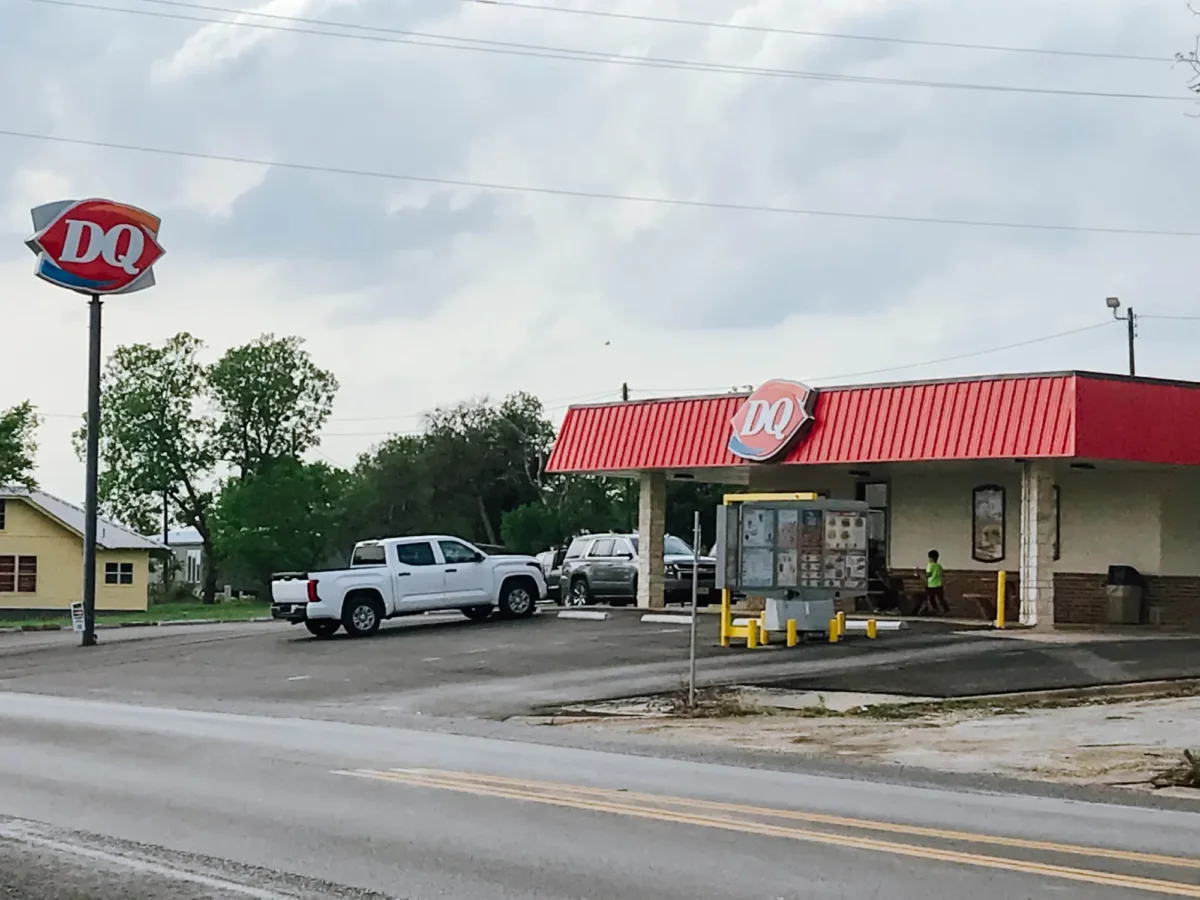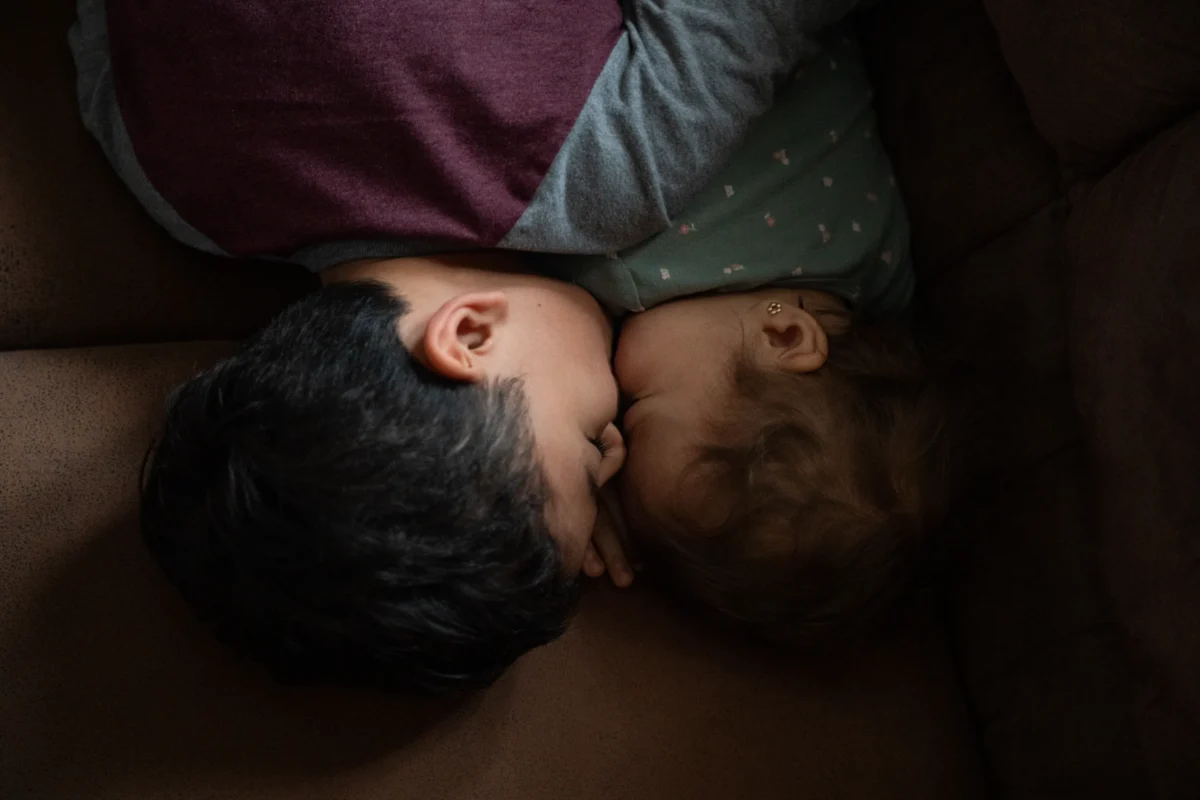
Small towns in Texas feel the loss of public community spaces when Dairy Queens close. (Photo by Jaime Adame / The Daily Yonder)
This story by Jaime Adame was originally published in the Daily Yonder. For more rural reporting and small-town stories, visit dailyyonder.com.
Small-town Dairy Queen franchises, many dating back 40 years or more in Texas, have long served as accessible gathering spots.
An online review of the local Dairy Queen put it plainly, though not perfectly: “Were we can talk to friends and family.”
Though written about a restaurant in the small East Texas community of Huntington, the reviewer described an experience shared by many across the state. In rural areas, sites where people choose to gather are “neither work nor home, but they anchor everything in between,” as a former rural school superintendent, Melissa Sadorf put it in a recent essay on the importance of what are sometimes called “third places.”
But this March, the Dairy Queen in Huntington closed abruptly.
“We were surprised,” said Bill Stewart, Huntington’s city manager. “When it is here for years and years and it’s a mainstay for the city – you just grow to expect it to always be there.”
A wave of Dairy Queen closures across Texas this year have hit small towns especially hard. Out of some 30 locations to shut down statewide, twelve were in towns with fewer than 3,000 people, like Huntington.
The closures come amid an ongoing legal dispute. The restaurants’ ownership, under the name Project Lonestar, Inc. and backed by a Los Angeles-based franchisee, alleged the chain’s corporate leadership effectively tanked attempts to sell off some of the restaurants and keep their doors open.
As part of a counterclaim filed on March 3rd of this year, the parent corporation sought more than $1.5 million in termination fees.
American Dairy Queen Corporation alleged that Project Lonestar, running 39 restaurants under separate operating agreements, failed to meet building and maintenance requirements, among other issues, leading the corporation to end most of them.
Whatever the cause of the shutdowns, civic leaders and townspeople must now grapple with literal empty spaces and rips in the fabric of community life.
“It’s an impact to our culture, absolutely,” said Remelle Farrar, interim director for the local economic development corporation in Canadian, a town of about 2,300 in the northernmost part of the state that’s still recovering from a massive wildfire early last year.
While both Farrar and Stewart spoke of efforts to bring in new businesses to the suddenly vacant locations, their path is far from clear. In recent years, other small communities in the state have found it a tall order to replace their local landmark Dairy Queen.
Why Are Small-Town Dairy Queens Closing?
To be sure, the view of Dairy Queen as a community’s social hub doesn’t ring true as much as it did decades ago, even in rural Texas.
“They don’t meet there like they used to,” said Bill Hall, who has owned Dairy Queen franchises in Texas since 1986. He said he’s down to two franchise locations, one in Fort Worth and another in rural Floydada, a town with a population of 2,675 northeast of Lubbock in Texas’ South Plains.
Despite a changing of the times – “everybody’s on the go,” Hall said, – Dairy Queen remains a Texas icon, making a closure loom large in small towns like Canadian.
“To me, it felt like everyone was talking about the Dairy Queen closing down, and everybody had a personal hypothesis about the Dairy Queen and what had happened,” Farrar said. The business appeared to be flourishing. “I saw my neighbors go for ice cream every night,” she said.
Hall, the longtime Dairy Queen operator, has not been involved with the closed restaurants, but he said his business in rural Floydada remains strong, and that it’s wrong to assume that all small-town Dairy Queens in Texas are struggling.
While restaurants are “a hard business,” he described the size of the Project Lonestar operation as contributing to some of the small-town locations closing.
“Some of the good stores in that group got sucked down, just because they were part of that bigger group,” said Hall, now CEO of private equity firm Align Capital, LLC.
Hall, formerly president of a group known as the Texas Dairy Queen Operators’ Council, said he knows other small-town Dairy Queen operators who are “doing great.”
“Those stores went through at least five owners that I know about over the last 20 years or so,” Hall said about the recent closures.
He said that, overall, relations between Texas franchisees and corporate Dairy Queen are “as strong as they’ve ever been.”
“I think you’re looking at an isolated incident of a group of stores that went through a lot of turbulent times,” Hall said.
He acknowledged, however, that closures over the years have eaten away at the number of Dairy Queens statewide, including in rural areas, with “less stores today than we’ve probably had in a lot of years.”
As many small Texas towns have seen people move away to more urban areas and had businesses close down, so, too, have some Dairy Queens shut their doors, according to Hall.
“There are a lot of small rural communities in Texas. You can’t have a Dairy Queen in every one of them,” He said.
In Rural Texas, Dairy Queens are ‘Third Places’
In Canadian, a town whose economy has over the years been supported by cattle ranching, nearby oil and gas exploration, and tourism, there are multiple locally-run restaurants.
But the Dairy Queen still served as an important gathering space, according to Farrar. She called it “a place to go for many members of our population after the event of the day, to go sit and talk… and relax.”
“It’s definitely going to be missed,” Farrar said.
Rural areas are more likely to struggle at providing such “third places,” according to Danielle Rhubart, a researcher at Penn State University who studies rural health and well-being.
“These places play an important role for social and emotional health, and in rural America we’re seeing a decline in these places as populations shrink,” Rhubart said.
In small communities, creating such “third places” can involve adapting unused buildings, even a former church. Rhubart said it’s important for small communities to support local businesses and make use of what’s already in place, such as libraries or outdoor spaces like parks, to ensure that welcoming places exist for people to gather.
Back in 2017, the Dairy Queen closed for good in Crosbyton, a small town with a population of about 1,500 roughly 40 miles east of Lubbock,The site stood empty until out-of-town restaurateurs this year announced plans to open up a sit-down taqueria at the site. While the restaurant has yet to open, pictures of the renovated interior posted on social media have been cheered by locals.
“Don’t ever give up, because the possibilities are endless,” said Martha Kirk, an economic development specialist and longtime Crosbyton resident, when asked how she’d advise other small towns facing similar circumstances.
The Dairy Queen in Crosbyton opened in the 1970s during Kirk’s junior year of high school – “a big highlight,” she wrote when describing her memories of Crosbyton for the local newspaper.
Up until the final meal served, the Dairy Queen remained a welcome part of her family’s routine.
“I’d have my grandkids, and we’d meet my husband, who’s a farmer, and one of my sons. We’d all meet at the Dairy Queen for lunch during the week,” Kirk said.
The Dairy Queen in Crosbyton fed “farmhands, people passing through town,” she said. “People after school would take their kids there for a treat.”
After Sunday church services, groups would often gather there, she added.
“It was devastating,” Kirk said of the closure. More than jobs were lost.
Many of the gatherings “just had to stop, because there was not a place to go,” Kirk said. The Dairy Queen closure left Crosbyton – actually, the entire county — without any weekend restaurant at all, she said.
The town has a senior center and another restaurant, the Chieftain Grill, open during the week, as well as a food truck or two. But another primary option for hot food, a Stripes convenience store, has actually shrunk its seating area despite its popularity, Kirk said.
“That makes it almost impossible to go in there and eat with a group,” she said.
Kirk said she knows of some who have taken to travelling 30 miles to Floydada just to eat in that town’s Dairy Queen (the same franchise location operated by Hall). Before the closure, “our Dairy Queen in Crosbyton was full all the time,” Kirk recalled.
The closure seemed, as far as Kirk could glean, to be “due to warring parties.” A lengthy legal trail, this time in bankruptcy court, shows the ownership entity, Vasari, LLC, describing itself as an operator of Dairy Queens with between $10 and $50 million in assets. Of the many small-town restaurants it owned that remained open, most, if not all, ended up as part of Project Lonestar.
Former Dairy Queens Take on New Lives
Among other towns whose Dairy Queens lamentably closed following the Vasari bankruptcy is Claude, a town of 1,186 east of Amarillo, where the restaurant site has been torn down and replaced by a large convenience store. That’s also the case in Merkel, a small town of about 2,500 near Abilene in west central Texas.
In Haskell, a town with a population of about 3,000, the local Dairy Queen is just a vacant building, and the same appears true in several similarly-sized towns.
But in at least two small Texas towns of about 2,000 people, restaurants are open at former Dairy Queen sites that were shut down in 2017.
Stratford, north of Amarillo near the Oklahoma border, has Brenda’s Kitchen, which advertises itself as serving Mexican food and burgers.
In Wellington, about 100 miles slightly southeast of Amarillo, a restaurant called The Gettin’ Spot Cafe moved in roughly a year after the Dairy Queen closed, according to Gina Warren, the restaurant’s owner, along with her husband, Charles.
Warren said the venture began in 2015 out of a renovated shed. After running it first as a drive through, Warren said she began to have thoughts of expanding.
“People were like, ‘You need a dining room,’” Warren said.
The Dairy Queen building remained vacant for about a year before she moved in, and the faint outline of the distinctive logo remains on the building, she said.
“Where the sun faded it, you can still see that. I haven’t done anything to the exterior, so it looks just like all the other Dairy Queens,” Warren said.
Inside, Warren keeps up with customer demand by offering a varied menu that includes pizza and chicken fried steak. She cited her religion as the true guiding force for the hard-earned success of the business, now celebrating its tenth year, which didn’t even sell hot food at its start.
“I probably would not do this in a bigger town. I never intended for it to be a restaurant. I never intended to own a restaurant. It just took on a life of its own,” Warren said.
The former Dairy Queen site is also in use again as a regular meeting space for some locals, according to Warren.
“I have a group of customers that come in every afternoon to drink tea and drink coffee and just sit and visit,” Warren said. “I think it’s absolutely important for people to have a place to come that they feel comfortable in.”
Stewart, the city manager in Huntington, which is just east of the small city of Lufkin, described efforts to bring in a potential food business in the old Dairy Queen spot.
“I have reached out to one corporation in particular that I’ve talked to on previous occasions, and they are interested in coming here,” Stewart said.
But it may take more than will to actually fill some of the Dairy Queen spaces.
Farrar, the economic development director in Canadian, said she knows of business owners interested in the old Dairy Queen site. But the pending lawsuit hinders efforts at a quick resolution.
“Especially as more Lonestar restaurants close, we’re in the dark,” Farrar said.
Already, the building’s contents – the kitchen equipment necessary to start-up any restaurant – have been put up for sale in an online auction.
“For now, there’s nothing we can do, and that’s the hardest part,” she said.
This article first appeared on The Daily Yonder and is republished here under a Creative Commons Attribution-NoDerivatives 4.0 International License.![]()













